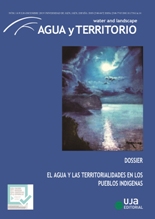Estrategias cosmopolíticas para la defensa del agua en territorio Mapuche-Huilliche
DOI:
https://doi.org/10.17561/at.14.4566Palabras clave:
Agua, Territorialidad, Espíritus-dueños, Estrategias cosmopolíticas, Mapuche-Huilliche, Chile, RupumeicaResumen
La significación del agua que organiza las estrategias cosmopolíticas de los territorios mapuche-huilliche, adquiere renovada importancia frente al actual contexto de privatización de los derechos de aprovechamiento de las aguas en Chile.
El caso de la comunidad MapucheHhuilliche de Rupumeica, configura un ejemplo único en Chile de ejercicio político indígena en que se consigue detener por diez años la construcción de un proyecto hidroeléctrico. Para lograrlo la comunidad de Rupumeica ha defendido el agua en nombre de sus mitos, de sus ritos, de los espíritus dueños del territorio en que habitan y de sus antepasados que poblaron ese lugar; así como en nombre de sus títulos de propiedad entregados por el Estado de Chile y del Convenio 169 de la Organización Internacional del Trabajo (OIT), firmado tanto por el Estado Chileno como el de Noruega (Nación a la que pertenece SN Power, empresa que desea construir dicho proyecto).
En el presente artículo se busca expresar el carácter que adquieren los ngen (espíritus dueños), especialmente el ngen-ko (espíritu dueño da água) e chao- ngenechen (unidad base, material-inmaterial) en la articulación de las estrategias cosmopolíticas para reclamar la participación Mapuche-Huilliche en la gestión de su territorio. Tal participación ha permitido impedir la construcción de la presa hidroeléctrica Maqueo, la cual propone desviar 6 ríos e inundar aproximadamente 180 hectáreas de sus territorios ancestralmente habitados, en las riberas del lago Maihue, comunas de Futrono y Río Bueno, en la región de los Ríos (andes austral, sur de Chile). En busca de comprender las estrategias y prácticas cosmopolíticas de protesta presentes en el conflicto, se observa un desacuerdo radical frente a la posibilidad de una apertura ontológica, que reivindica territorialidad, hogar y linaje, frente a las transformaciones territoriales impuestas por el desarrollo económico nacional. En este sentido el desacuerdo que emerge entre aquello que se considera a sí mismo “el todo” (El Estado nación) y la existencia de aquello que lo excede (la cosmopolítica indígena que no deja marcas en la historicidad del Estado nación).
Descargas
Referencias
Agenda 21 2004: Programa Eco-Región de Los Lagos Sustentable. Diagnóstico de la Comuna de Lago Ranco. s. d.
Avila P. 2016: “Hacia una ecología política del agua en América Latina”, Estudios Sociales, 55, 18-31, http://dx.doi.org/10.7440/res55.2016.01
Barabas, A. (Coord.) 2004: Diálogos con el Territorio. Simbolizaciones sobre el espacio en las culturas indígenas de México. México, CONACULTA-INAH.
Barabas, A. 2006: Dones, Dueños y Santos. Ensayos sobre religiones en Oaxaca. México, Porrúa-INAH.
Bauer, C. 2004: Canto de sirenas: El derecho de aguas Chileno como modelo para reformas internacionales. Bilbao, Bakeaz
Correa, P. 2013: Se aprueba veto que excluye consulta indígena y protección de áreas verdes por Ley de Concesiones. s. d.
De la Cadena, M. 2015: Earth beings, ecologies of practice across Andean worlds. Durham: Duke University Press. https://doi.org/10.1215/9780822375265
De la Cadena, M. 2018: “Natureza incomum: histórias do antropo-cego”, Revista do Instituto de Estudos Brasileiros, 69, 95-117. https://doi.org/10.11606/issn.2316-901X.v0i69p95-117
DGA-MOP, 2011: Informe de derechos concedidos y solicitudes en trámite. No publicado. Obtenido mediante Ley de Transparencia.
Gentes, I. 2001: Derecho de Agua y Derecho Indígena.-Hacia un reconocimiento estructural de la gestión indígena del agua en las legislaciones nacionales de los Países Andinos. Recuperado de https://agua.org.mx/biblioteca/derecho-de-agua-y-derecho-indigena-hacia-un-reconocimiento-estructural-de-la-gestion-indigena-del/.
Guerrero R. M.; Fonseca, F.; Garrido, J. y García, M. 2018: “El código de aguas del modelo neoliberal y conflictos sociales por agua en Chile: relaciones, cambios y desafíos”, Agua y territorio, 11, 97-108. https://doi.org/10.17561/at.11.3956
Larraín, S. 2006: “El agua en Chile: entre los derechos humanos y las reglas del mercado”, Polis, 5(14), 1-18.
Latta, A. y J. Sasso, J. 2014: “Megaproyectos hídricos y conflicto socio-ambiental en Latinoamérica: perspectivas teóricas desde Gramsci y Foucault”, Agua y territorio 4, 70-83.
LEUFU 2010: Espíritu ancestral mapuche, [documental], producido por Native Spirit Foundation, Reino Unido, Vimeo, (36m.:39s.), son, col.Tendier, S. (Director) (2006).
Santos, M. 2011: O mundo global visto do lado de cá [Documental]. Brasil: CALIBAN. Recuperado de http://www.youtube.com/watch?v=-UUB5DW_mnM.
Lowy M. 2014:. A jaula de aço: Max Weber e o marxismo weberiano. Boitempo Ed, São Paulo.
Molina, R. y Yáñez, N, (comp.). 2011: Las aguas indígenas en Chile. Santiago de Chile, LOM.
Toledo, V. 1997: “Todas las aguas. El subsuelo, la ribera, las tierras. Notas acerca de la (des)protección de los derechos indígenas sobre sus recursos naturales y contribución a una política pública de defensa”, o: Anuario Liwen, 3, 1-34.
Torres R.; García, A. y Rojas, J. 2017: “Privatizando el agua, produciendo sujetos hídricos: análisis de las políticas de escala en la movilización socio-hídrica contra Pascua Lama e HidroAysén en Chile”, Agua y territorio 10, 149-166. https://doi.org/10.17561/at.10.3615
Yáñez, N. y Gentes, I. 2005: Derechos locales sobre las aguas en Chile: Análisis político y jurídico para una estrategia de gestión pertinente en territorios indígenas. s. d.
Visión Ingenieros Ltda 2007: Plan Marco de desarrollo territorial. Informe Final Territorio Valdivia (PMDT). s. d.
Descargas
Publicado
Número
Sección
Licencia
© Universidad de Jaén
Los originales publicados en las ediciones impresa y electrónica de esta Revista son propiedad de la Universidad de Jaén siendo necesario citar la procedencia en cualquier reproducción parcial o total.
Salvo indicación contraria, todos los contenidos de la edición electrónica se distribuyen bajo una licencia de uso y distribución “Creative Commons Reconocimiento 4.0 España” (CC-by). Puede consultar desde aquí la versión informativa y el texto legal de la licencia. Esta circunstancia ha de hacerse constar expresamente de esta forma cuando sea necesario.














